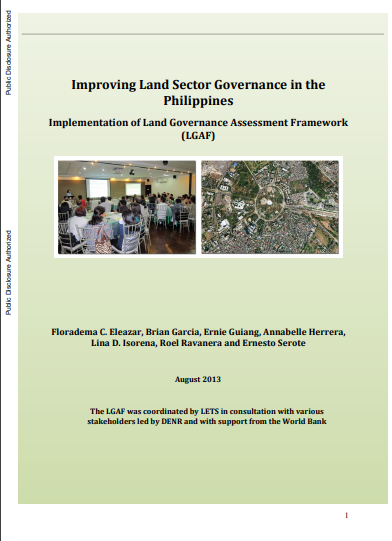Resource information
Land is considered a vital resource for any nation. It serves as the platform for carrying out
social, cultural and economic activities. Access to land is an important means for promoting
growth and equity and achieving social justice in many countries. The process by which
decisions are made regarding access to and use of land, the manner in which those decisions are
implemented and the way that conflicting interests in land are reconciled are crucial in
determining whether the country has what it takes to derive the desired benefits from this
limited natural capital.
The Land Governance and Assessment Framework (LGAF) was developed by World Bank and
its partners to provide a tool for diagnosis of land governance issues, establishment of
benchmarks and monitoring progress over time. It comprises a set of detailed indicators to be
rated on a scale of pre-coded statements (from lack of good governance to good practice, A-D).
The process helps to establish a consensus and priority actions on: (i) gaps in existing evidence;
(ii) areas for regulatory or institutional change, piloting of new approaches and interventions to
improve land governance on a broader scale; and (iii) criteria to assess the effectiveness of
these measures. Thus, LGAF helps put in place a structure and process to systematically track
progress in improving land governance over time.
At the time of LGAF completion in the Philippines, about 36 countries have carried out and/or
are in the process of undertaking similar studies; with a number of them effectively using the
results for broader stakeholder engagement on land issues, and developing policy options for
moving forward. Other countries such as Peru, for example, have set up independent land
observa


